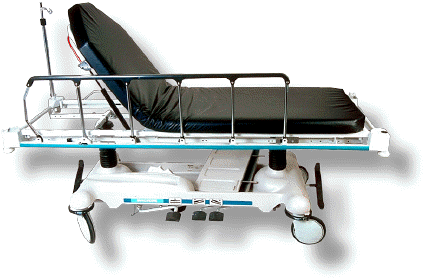For sure, Intel's chairman Craig Barrett is a hugely intelligent man. Otherwise, he wouldn't be heading up the giant chip-making firm. But in our experience intelligence often doesn't equate to smart or worldly-wise and that seems to be borne out by Mr B's latest utterings.
Speaking at the recent White House Conference on Aging - a once-in-decade event (and thank the Lord for small mercies) - Barrett set out to tell the world how technology could help the elderly return to their homes, freeing up expensive hospital beds and reducing the costly time that medical professionals are involved.

That's better!
According to Intel's own press release about the event - or more accurately about its chairman's speech there - Barrett, "pointed to new computer-based technologies and innovations in sensors, software and wireless technologies that can allow such vital information as heart rate, respiratory rate, blood pressure and sleep patterns to be tracked remotely."
Barrett seemingly further added, "Broadband Internet connectivity allows the data to be shared real-time between seniors and healthcare professionals, as well as amongst family members and friends who deliver the majority of care to seniors".
While not disputing in any way the seriousness of the financial problem that long-lived citizens present to the developed world - or our need to find solutions - we feel that we must cast a small shadow of doubt over Barrett's well-meaning (we assume) master plan.
Don't get us wrong, we're not taking a moral stance here. Instead, we're being utterly selfish. Truth is we're plain scared about putting our lives into the hands of WiFi and broadband. The thought of doing so in no way helps our insipient incontinence. Quite the opposite.
And our fear is based not on our own massive brain power but on a whole lot of real-world experience with those still-far-from-reliable technologies. Indeed, with the current state of development of WiFi and broadband - and particularly WiFi's inability to work seamlessly or reliably - we don't think it's being overly cynical (okay we do, but we'll say it anyway) to see this as being a recipe for a sort of automated, if random, form of euthanasia.
Mind you, it does at least present one sort of solution to the problem.

Problem solved!
Just think of all the hours you've personally wasted trying to get WiFi working - and remember those times when you failed totally. Don't cast your mind back a year or two ago, just think about the up-to-date kit that has given you massive grief in the last few weeks and months. Then think of how long it took for your broadband connection to be restored the last time it went down. Finally, consider the idea that your very life might depend on WiFi and broadband.
It is a very scary idea, isn't?
So, while Barrett might say that, "Developing technologies to keep people well and moving care from the hospital to the home are central to transforming the healthcare system" and “A broad range of personal health technologies designed to go into the home hold hope for seniors to ‘age in place’, maintaining their independence and deferring costly institutional care”, we'd say, "Come back and tell us about it later - when Intel, Microsoft and a whole bunch of other firms have sorted out their own problems with these technologies".
Are we being massively cynical or unreasonable about Craig Barrett's White House speech? Well, read the release, then have your say over in the HEXUS.community, where you might also care tell us just how comfortable you feel about your life - or a loved one's - depending on today's WiFi and broadband technology.






